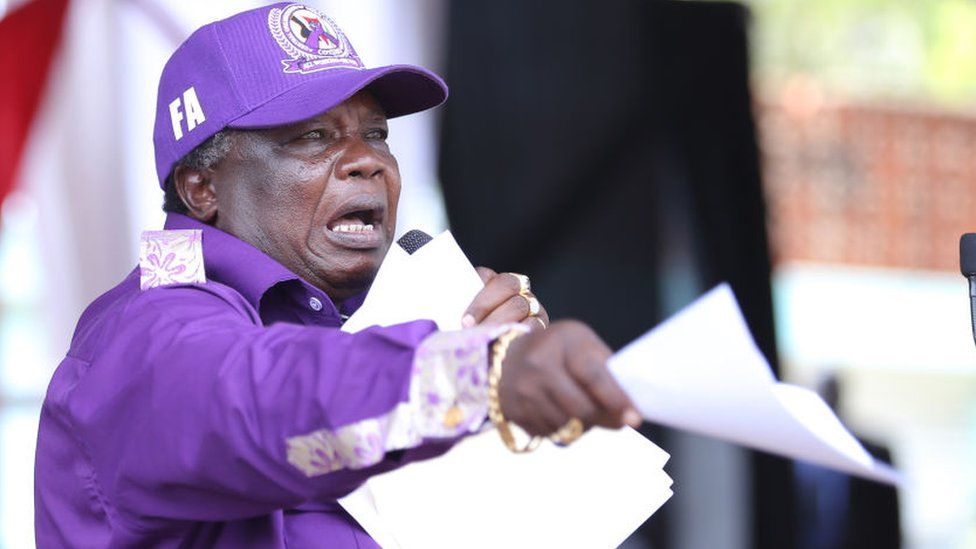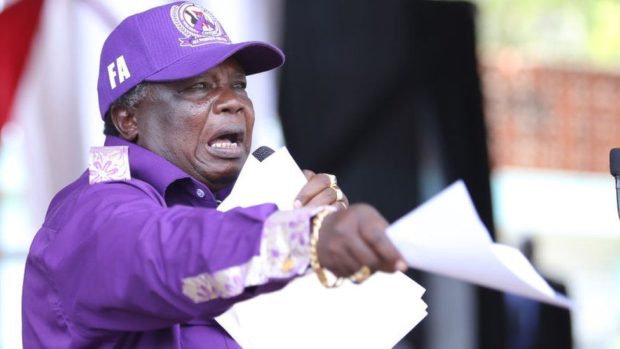 IMAGE COPYRIGHTGETTY IMAGES
IMAGE COPYRIGHTGETTY IMAGESA furious row has erupted in Kenya’s capital, Nairobi, over the renaming of a road in honour of the head of the organisation representing labour unions, Francis Atwoli.
The backlash has seen the fresh signpost marking the new name pulled down, put back up, burnt and restored once more.
Dik Dik Road – named after the small antelope – in the upmarket Kileleshwa suburb was renamed Francis Atwoli Road late last month.
Never has a street sign attracted this much attention in Kenya.

Critics say Mr Atwoli is unworthy of the honour as he has not improved workers’ conditions during his two decades at the helm of the Central Organization of Trade Unions (Cotu).
This week a hastily erected temporary hand-written sign was replaced with the newly minted one, put up with great fanfare by his supporters – who promised to guard it from vandals.
Activists allege the name change is illegal as the public was not invited to comment on the proposal as is required by law.
Some local residents are now taking legal action against Nairobi county.
‘My name will live in posterity’
Mr Atwoli himself has condemned the vandalism, putting it down to envy.
“My name is all over the world and one doesn’t require a street signage for them to know who Francis Atwoli is,” he posted on Twitter.
“The name will live in posterity taking into account my years of selfless service to the workers in Kenya and the world.”
Though he said had he been involved, he would have chosen a road that matched his stature.
“It does not hurt me at all as I didn’t propose to have a road name after me. After all if I was asked to choose, I’d have chosen very very prominent road in Nairobi to be named after me – a bigger road than that one,” he told Kenya’s NTV.
Nairobi’s Acting Governor Ann Kanunu said it was hard to understand why people were so angry given the name change reflected Mr Atwoli’s “selfless love and devotion to the country“.
But the 72-year-old has recently been vocal in his support for President Uhuru Kenyatta’s plan to make fundamental changes to the constitution, known as the Building Bridges Initiative (BBI).
It proposes to expand the executive arm of government, but it has divided the country and last month the high court blocked the move, saying it was irregular, illegal and unconstitutional. The government is now appealing.
On Twitter, there is intense lobbying against what many see as the politicisation of road names in the capital.
The tone may be hardening – but the issue has also become a source of hilarious memes and quips.

The most recent version of the sign looks like it is made of marble, with some implying it is now indestructible.

Others are critical of the opposition to the sign, arguing that there are more important misdeeds to lobby against in the East African nation.
“Aren’t there more despicable characters for whom streets, roads, institutions, landmarks, natural features, monuments, and buildings are named?” academic and columnist Makau Mutua tweeted.
For the local chapter of Amnesty International the road name row is more about “the governance of public spaces”.
“The controversy illustrates how disconnected the Nairobi county government is from the citizens it serves. It also reflects its capture by politicians who seem ignorant of bylaws or policies that regulate physical planning and the naming of streets,” it said in a statement.
And the issue is unlikely to die down given that activists are now planning to hold a demonstration on Francis Atwoli Road.
“This is impunity and we will not be bullied into silence. This is not over,” said activist Boniface Mwangi, who has been the face of the push to retain the street’s old name.
bbc.com
 Home Of Ghana News Ghana News, Entertainment And More
Home Of Ghana News Ghana News, Entertainment And More





